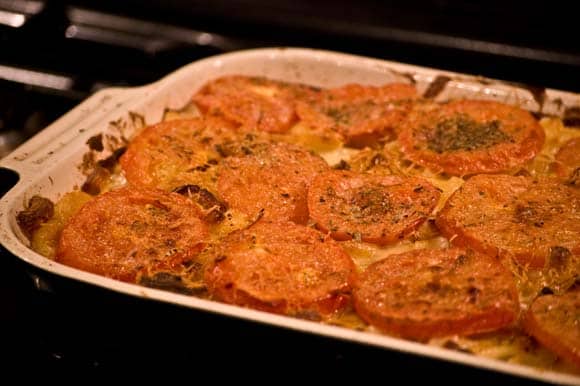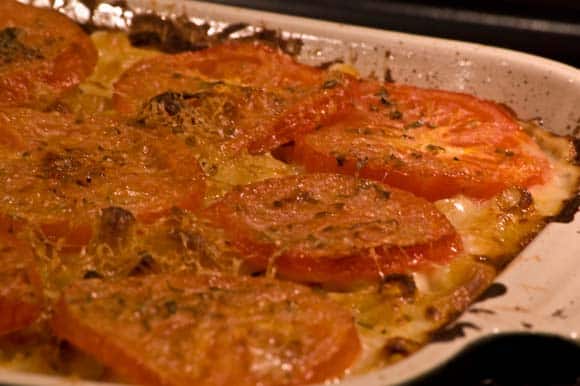I heard on National Radio to the other day that the average kiwi watches 3-5 hours TV a day. I was flabbergasted, how do they fit it all in? I assume they must stay up past my regular bedtime. My TV viewing averages about an hour on a weekday and maybe two hours a day on a weekend. I’m just not a big TV watcher these days even if my husband reckons I spend much of my day watching day time TV. If only!
Admittedly I probably offset my TV time with blog reading and writing. It does at least beat much of the rubbish there is to watch on the box.
A new reality TV show caught my eye on the Guardian Food blog and armed with an extra cup of tea early one Saturday morning we hooked up to the BBC iplayer to watch Economy Gastronomy. This is another take on getting to get people to eat well and save themselves some money. It was fantastic HTTV (human interest TV) where you can escape for an hour.
In the first episode there was a family who never ate together and basically lived on ready meals cooked in the microwave or takeaways. What I found incredulous was that their 8 year old son ate macaroni cheese three times a week but what was totally stunning was that he sat and ate his dinner on the floor. Their 2 year old twins ate mostly processed food but they did at least sit at the table.  The challenge was to save 130 GP pounds per week off their shopping which would equate to 4,000 GBP per year.
The family had to follow a system of menu planning, shopping and home cooking. They were aided in their quest by the two top chefs. Like all these sorts of programmes there was an element of people learning something they just didn’t know (like how to cook basic food) and be more disciplined about new habits (shopping).
The family in episode one were successful in their challenge which was a huge relief given how simple it was really. This family were a classic case of time poor but with the right encouragement and direction they were able to be more resourceful than they ever thought possible. What was really interesting was that the amount they saved in their food bills was roughly equivalent to the amount the mother earned as a part-time teaching assistant.
It did make me chuckle though to listen to the professional chefs. Their system is simple and sensible but they are still professional chefs and there were occasions where their foodie tendencies rather let them down. Talking about the basics for their stock cupboards Allegra waxed lyrical about the merits of balsamic or sherry vinegar. I ask you – hardly basic food stuffs you’d find in most people’s kitchens.
I give them credit though for extending people’s thinking about basic recipes. They put a foodie spin on macaroni cheese which had bacon and artichoke hearts in. I can thoroughly recommend it as I made it one night last week and it was very tasty. They also recommended a base dish which you cook up a big batch of and then use it as a base for other meals. In the first episode it was braised mince that they used for chilli.
Watching the second episode there was a new family – this one was wealthy living in a swanky house but had fallen on harder times so saving money was a critical part of their downsizing. Similar situation – time poor family and not enough time to cook and eat together.
I think back to the time when we lived in the UK. It was pretty much survival catering during the week and only on weekends that we made a real effort to cook something special. The range of ready made or easy to assemble cooking options in the supermarket was vast so it’s easy to see how people start to rely on them to feed their families.
Even though I do have/do make the time to cook properly almost every day now I am a Domestic Executive there isn’t much of an option. There just isn’t the range of ready cooked meals for sale here in New Zealand although I’ve noticed recently that there are more on the shelves. They tend to be fresh pastas, Indian or other Asian foods. Whatever the choice it is expensive and to be honest I’m not sure that it will taste anywhere near as good as the version you can make yourself.
Watching Economy Gastronomy was a good reminder of some of the basic principles of home economics – plan ahead, stick to a budget, use your imagination and even if in doubt, give it a go. Pity that teaching some of these life skills is still missing from school. I come from a generation who did cookery at school. My mum was a great cook so I’ve had plenty of encouragement and training over the years. It’s only now I recognise how lucky I am.


Must give that show a watch. I can’t even imagine spending £130 a week on food never mind being able to save that much from my food bill. I chose to stay at home when the boys were little and there were times when we were quite hard up. I still don’t see why I shouldn’t save money food shopping and I know when and where all the reduced food items occur in the various supermarkets. Sommerfields is the best regularily taking 70% off fresh foods at the end of the day. We also have a local independent supermarket which often has short or out of code items at very low prices which I buy, cook and freeze. At least my boys know how to cook using fresh cheap ingredients. We still do some cooking at school teaching the children to make fresh fruit salads, vegetable soups and pizzas as well as the usual cakes and biscuits.
Ruta, it will make your hair stand on end then for episode. These people spent 17,000 GBP on food and the trailer for episode 3 they spend 21,000 GBP. It seems that its the ready meals and processed food that costs. JT
Sounds a fascinating show – but frightening too!
It’s always so much nicer to prepare one’s own food and that’s often my favourite part – particularly with salads and vegetables (but I end up eating half before anything makes it to the plate at the moment!). I am so grateful for our home economics classes at school and still have my little recipe book we made – it has all the basic essential recipes for good home cooking.